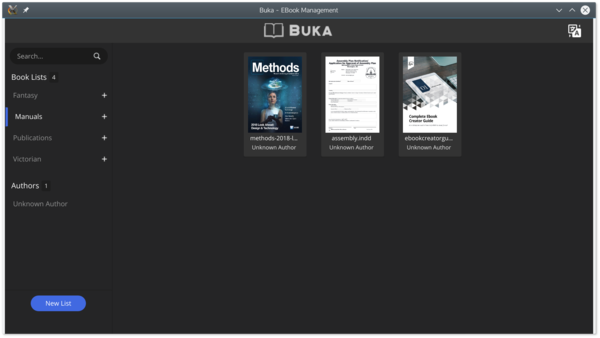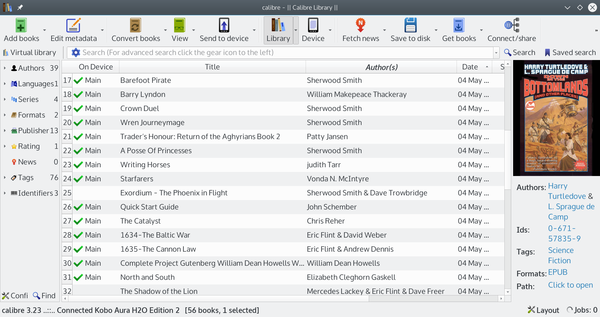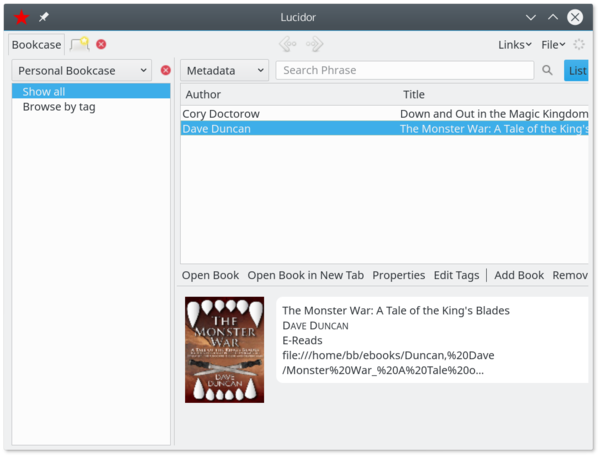Choosing an Ebook Manager
Buka, Calibre, and Lucidor
ByWhen it comes to organizing your online reading materials, the three main contenders on Linux are Buka, Calibre, and Lucidor. Read on to find out which one is right for you.
If you are reading on a screen, nothing beats the resolution and glare controls of an e-reader. However, e-readers have become a niche market. Today, many people read online from their everyday computers – and in ever-increasing numbers. In 2017, over 266 million ebooks were released in the United States alone, and the numbers have increased every year since 2003.
With all this reading material comes an increased need to manage it. Some readers prefer to trust to Google Books or Library Thing to organize their reading when online editions are available; others use a general collection manager, although many, like Tellico, are designed for physical objects rather than electronic ones. Many, however, use a specialized manager to organize their books, newspapers, and articles online.
In fact, another mark of online reading’s popularity is how quickly ebook managers seem to come and go. For example, a couple of years ago, CoolReader was widely praised as an up and coming ebook manager – today, its Linux development seems to have been abandoned, and you are unlikely to get it to compile while using a recent kernel. Similarly, as I write, at least two projects are receiving a lot of advance notice, although both are too early in their development to recommend. For the time being, the three main ebook managers available on Linux are Buka, Lucidor, and Calibre. Which one is right for you depends mostly on whether you just want to organize your online library, or whether you are looking to use other functions, such as searching for new reading material online or converting from one ebook format to another.
Buka
Buka (Figure 1) is an application that is stable, but still relatively early in its development. It features a streamlined interface with controls that are only visible when the cursor passes over them and that are easy to learn as you need them. Right now, you can use Buka to create lists of publications that are searchable, as well as displayed by author. Select a listed item, and it opens in an interface reminiscent of Okular, KDE’s general document viewer. A particularly interesting feature is a built-in translator.
For now, Buka supports only PDF format. However, the lack of clutter makes Buka easy to navigate and definitely one to watch.

Calibre
In the best Linux tradition, Calibre (Figure 2) offers everything you might need in one place – and does so more completely than any other application. At its most basic, Calibre organizes your online reading material and allows you to search for them by name and author, as well as any other metadata that happens to be attached to their files. In fact, for your convenience, you can edit file metadata to make material easy to find. You can also send files to external devices and keep devices synced with a click of an icon. There is even a plugin for removing digital rights management (DRM) arrangements, although you didn’t hear that from me.
However, that is not all that Calibre does. If you are shopping for a new ebook or an online newspaper, Calibre has the most comprehensive list of online sources that I have seen, whether free or proprietary. Want to convert from one ebook format to another? Calibre does that, too – automatically for the most part, although you can also drop down to a text editor and manage the conversion by hand.
Calibre advises you to keep your copy of the project updated manually from the project’s website, but take that advice with a pinch of cynicism. In my experience, Calibre’s constant tweaking sometimes breaks as much as it fixes. For instance, I have known the Add Books feature to be broken for weeks at a time before it was functional again. If you have a stable version of Calibre that does all that you want, consider sticking with it for as long as you can.
Note, too, that Calibre’s interface is stuck somewhere in 1995. It is navigated chiefly by a poorly organized toolbar that occupies two rows. Unfortunately, icons on the second row can be glimpsed, but close before you can click on them. If Calibre was not so full of features, its interface would be enough reason to avoid it altogether. As things are, Calibre’s interface can be forgiven for the sake of its feature set – but just barely.

Lucidor
Although farther along than Buka in development, Lucidor (Figure 3) shares some of Buka’s attention to interface design. At the same time, Lucidor also has something of Calibre’s links to online sources for ebooks and online reading material, which Lucidor can convert easily into an ebook if necessary. However, it lacks features for converting between ebook formats, syncing with ebook readers, or reading any format other than .epub. A minor annoyance is that the English version retains some links to French sources that cannot be deleted, although they are easy enough to ignore.
Lucidor opens on a series of links. Most of the time, you will probably want to open the Bookcase or else the link to the last item opened. As you click, Lucidor opens a trail of tabs, making it easy to retrace your steps.
Like a file manager, the Bookcase can display items as icons or a list, and the display can be filtered by metadata. To open an item, click so that it appears in the bottom right pane and then select from the available items in the pane’s menu. By default, an open item displays with a table of contents on the left, and the text on the right. The text can be displayed using the information in the file or to fit the open window, either in a single or a double column in a size of your choice – although exactly what the measurement may be is obscure. Readers can also opt to display search fields, arrow keys for scrolling, and links for moving to the next or previous chapter. The only tool that some might miss is the ability to change fonts.

Making a Choice
For those who prefer a complete feature set, the obvious choice is Calibre. However, for some, Calibre is overkill, and for others its interface's poor quality and ever-recurring bugs are a reason to avoid it.
For managing and reading ebooks, either Buka or Lucidor is more or less a match for Calibre and offers a less cluttered interface. The days when e-readers required a special app for backing up to a computer are long gone – these days, all you need is a file manager. And if you do need a more advanced feature, such as editing an ebook file format, you can use an app like Sigil, or one of the numerous available scripts available in Debian. Whatever ebook manager you choose, you should find a way to do what you need, often using the same app as you would on another operating system.
next page » 1 2
Subscribe to our Linux Newsletters
Find Linux and Open Source Jobs
Subscribe to our ADMIN Newsletters
Support Our Work
Linux Magazine content is made possible with support from readers like you. Please consider contributing when you’ve found an article to be beneficial.

News
-
LibreOffice 26.2 Now Available
With new features, improvements, and bug fixes, LibreOffice 26.2 delivers a modern, polished office suite without compromise.
-
Linux Kernel Project Releases Project Continuity Document
What happens to Linux when there's no Linus? It's a question many of us have asked over the years, and it seems it's also on the minds of the Linux kernel project.
-
Mecha Systems Introduces Linux Handheld
Mecha Systems has revealed its Mecha Comet, a new handheld computer powered by – you guessed it – Linux.
-
MX Linux 25.1 Features Dual Init System ISO
The latest release of MX Linux caters to lovers of two different init systems and even offers instructions on how to transition.
-
Photoshop on Linux?
A developer has patched Wine so that it'll run specific versions of Photoshop that depend on Adobe Creative Cloud.
-
Linux Mint 22.3 Now Available with New Tools
Linux Mint 22.3 has been released with a pair of new tools for system admins and some pretty cool new features.
-
New Linux Malware Targets Cloud-Based Linux Installations
VoidLink, a new Linux malware, should be of real concern because of its stealth and customization.
-
Say Goodbye to Middle-Mouse Paste
Both Gnome and Firefox have proposed getting rid of a long-time favorite Linux feature.
-
Manjaro 26.0 Primary Desktop Environments Default to Wayland
If you want to stick with X.Org, you'll be limited to the desktop environments you can choose.
-
Mozilla Plans to AI-ify Firefox
With a new CEO in control, Mozilla is doubling down on a strategy of trust, all the while leaning into AI.
